新概念英语二册 Lesson 38 Everything except the weather 课件 (共42张PPT)
文档属性
| 名称 | 新概念英语二册 Lesson 38 Everything except the weather 课件 (共42张PPT) |  | |
| 格式 | pptx | ||
| 文件大小 | 5.6MB | ||
| 资源类型 | 教案 | ||
| 版本资源 | 新概念英语 | ||
| 科目 | 英语 | ||
| 更新时间 | 2024-02-19 18:55:12 | ||
图片预览

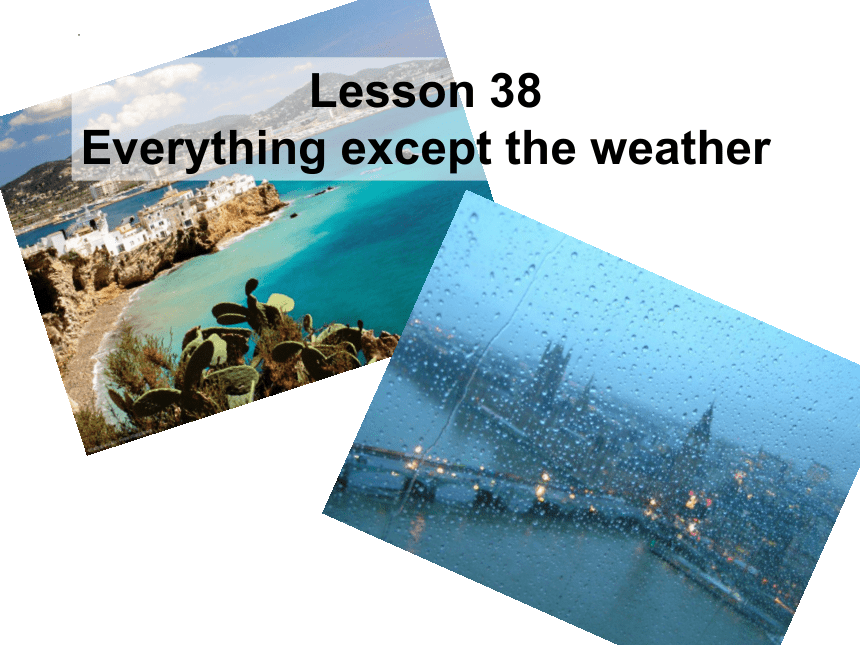
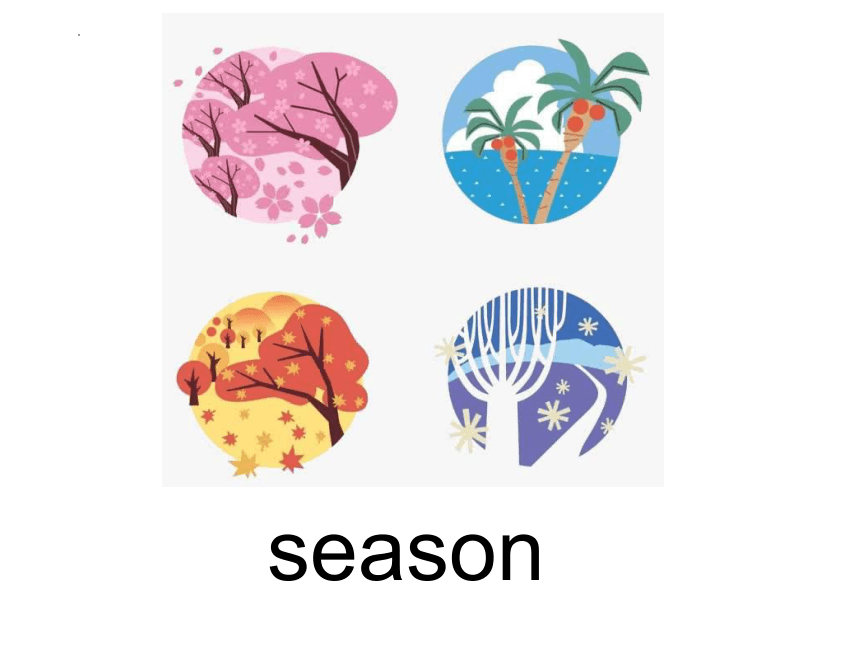
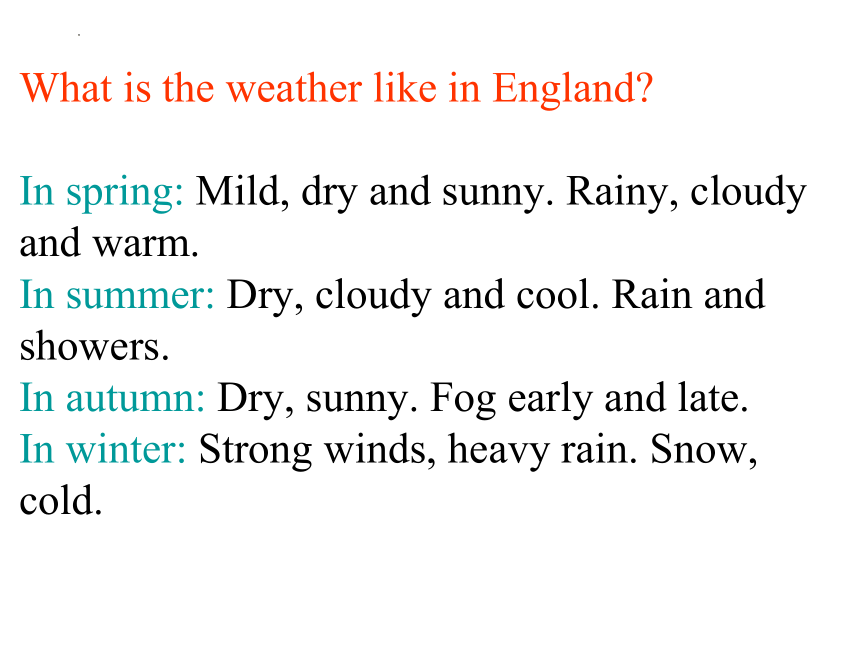
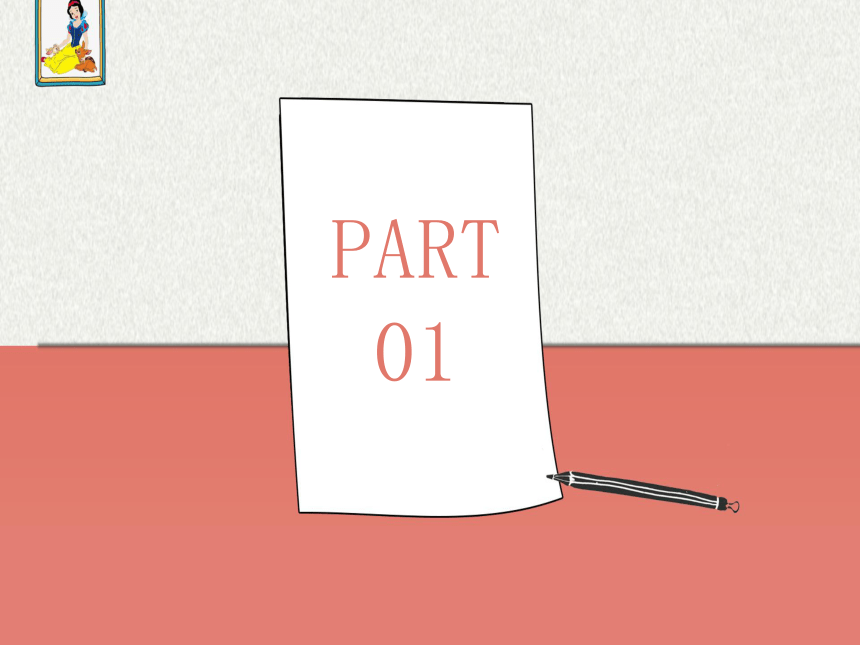
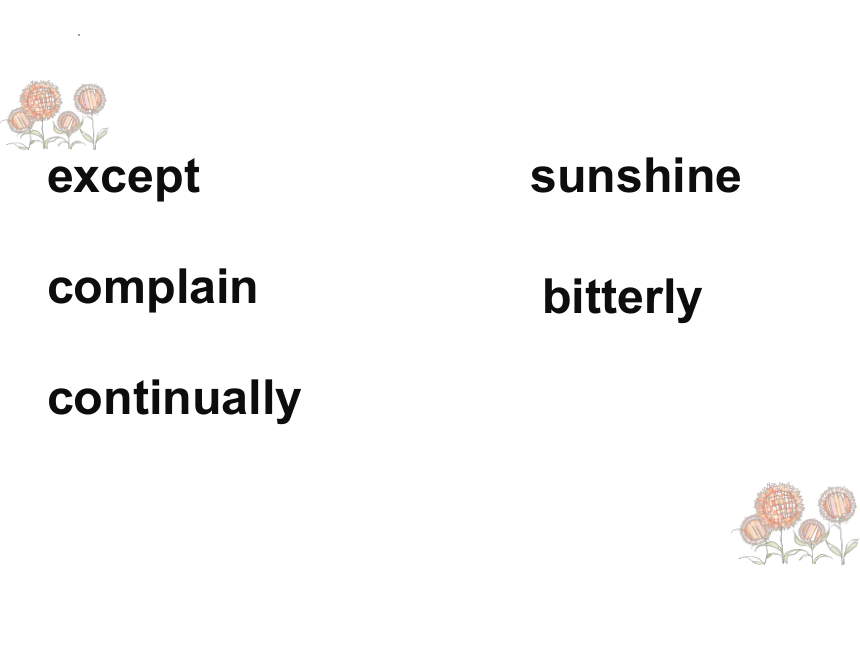
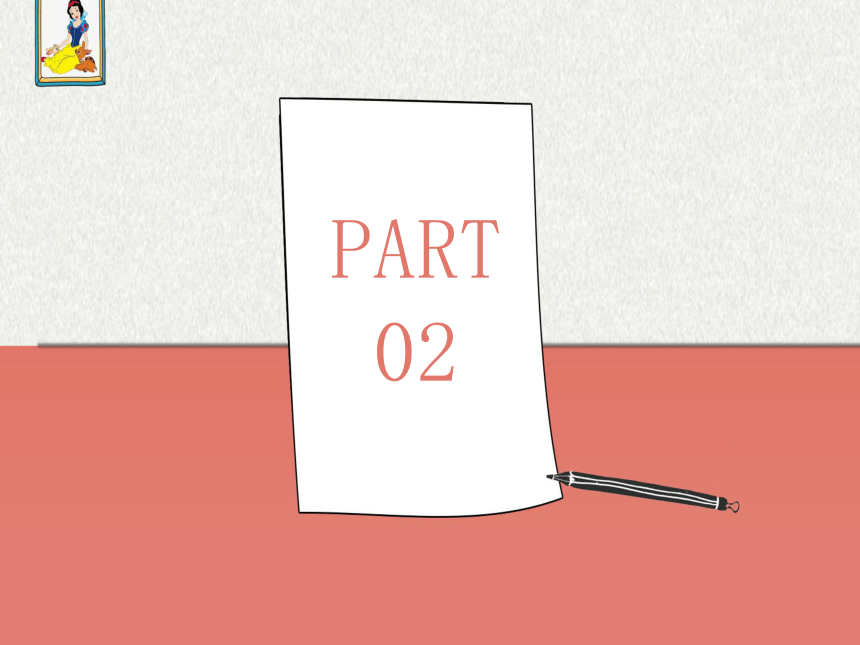
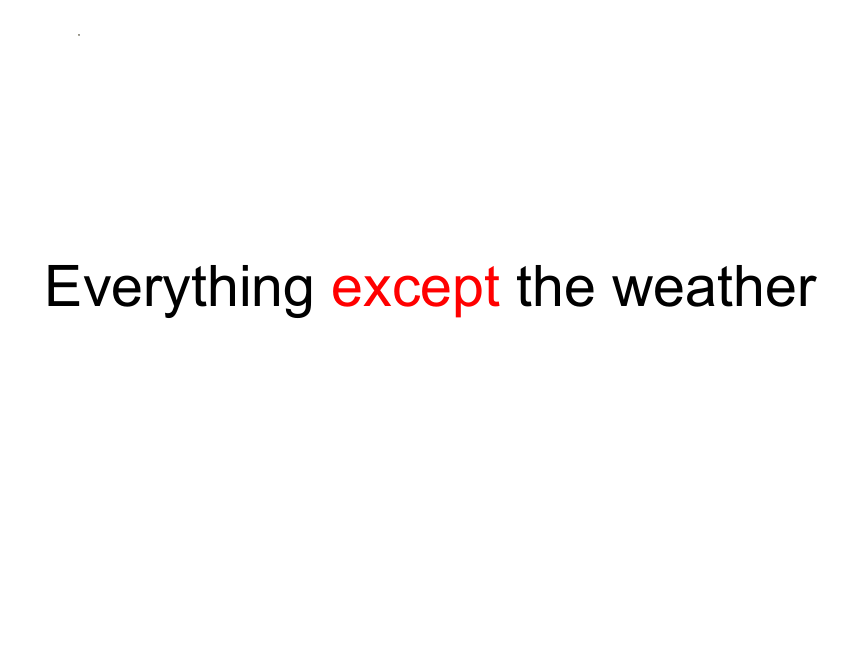
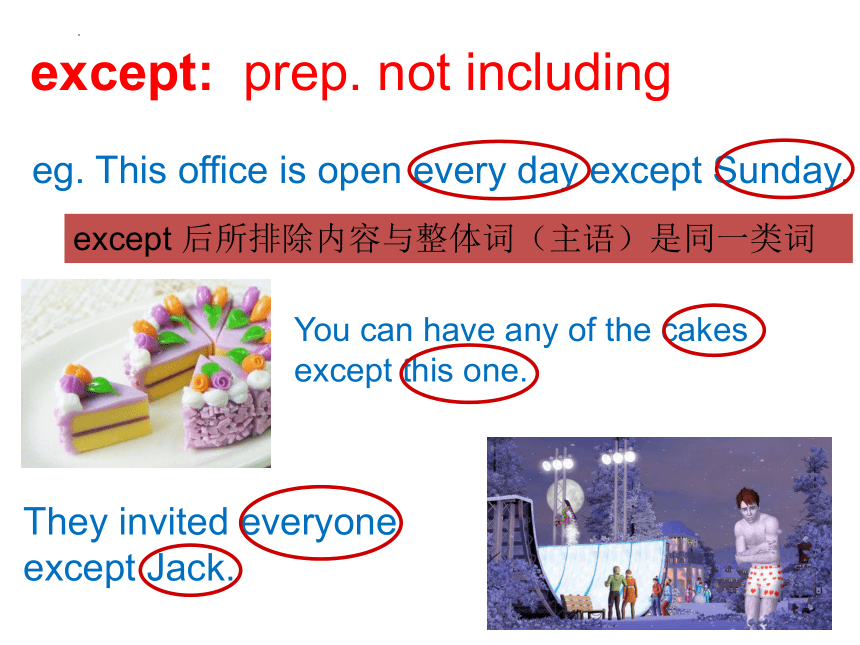
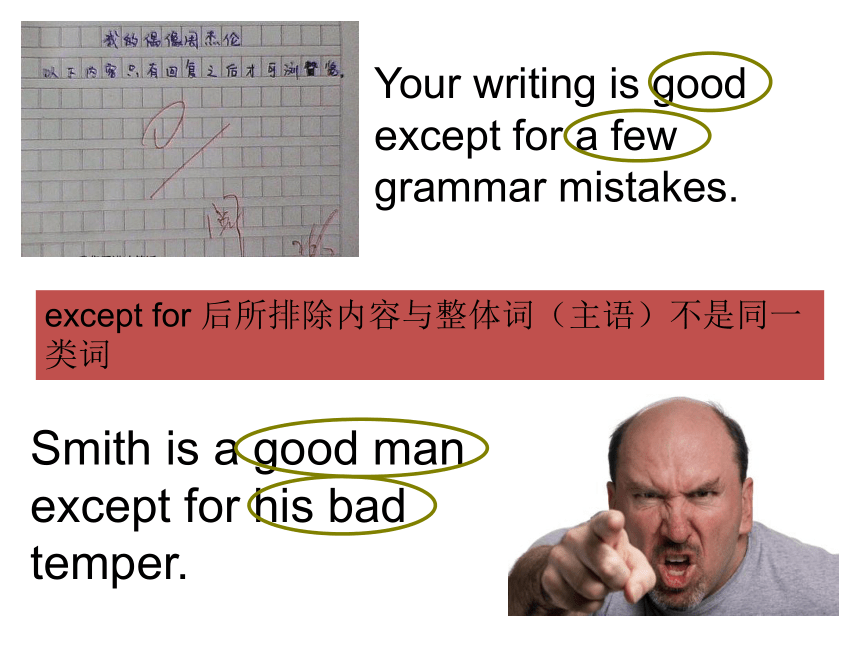
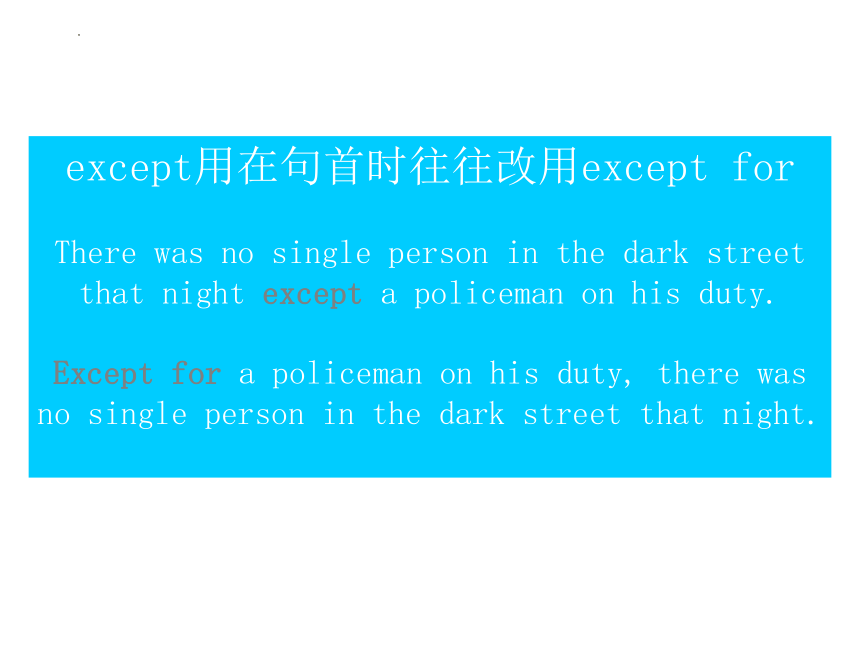
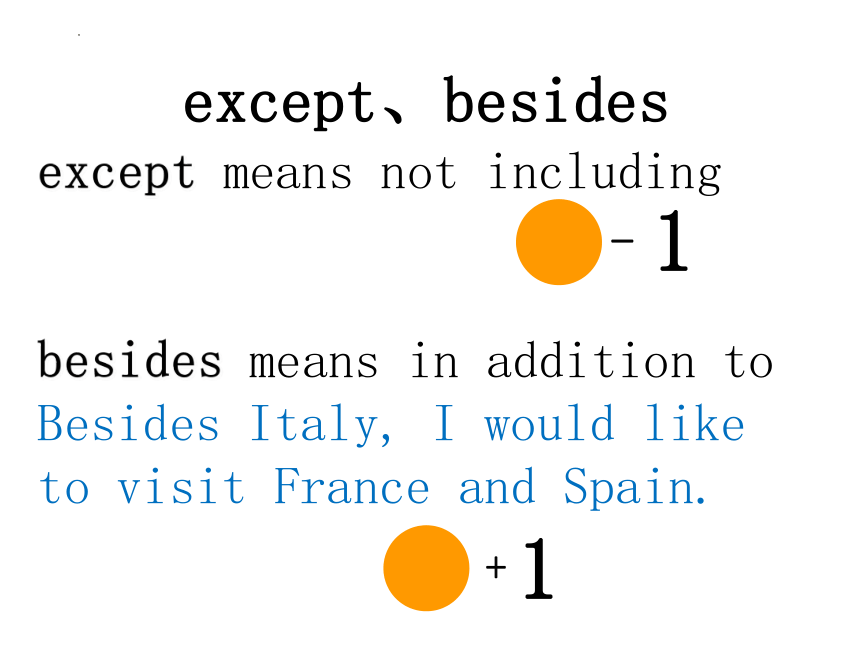
文档简介
(共42张PPT)
Test
Lesson 38
Everything except the weather
season
What is the weather like in England
In spring: Mild, dry and sunny. Rainy, cloudy and warm.
In summer: Dry, cloudy and cool. Rain and showers.
In autumn: Dry, sunny. Fog early and late.
In winter: Strong winds, heavy rain. Snow, cold.
PART
01
except
sunshine
complain
continually
bitterly
PART
02
Everything except the weather
except: prep. not including
They invited everyone except Jack.
eg. This office is open every day except Sunday.
You can have any of the cakes except this one.
except 后所排除内容与整体词(主语)是同一类词
Your writing is good except for a few grammar mistakes.
Smith is a good man except for his bad temper.
except for 后所排除内容与整体词(主语)不是同一类词
except用在句首时往往改用except for
There was no single person in the dark street that night except a policeman on his duty.
Except for a policeman on his duty, there was no single person in the dark street that night.
except、besides
except means not including
besides means in addition to
Besides Italy, I would like to visit France and Spain.
+
1
-
1
1. My old friend, Harrison, had lived in the Mediterranean for many years before he returned to England.
2. He had often dreamed of retiring in England and had planned to settle down in the country.
3. He had no sooner returned than he bought a house and went to live there.
= As soon as he returned, he bought a house and went to live there.
No sooner…than 一…就…(= as soon as)
结构:主语 + had no sooner done + than + 一般过去时的句子。
我一到家,就开始下雨了。
I had no sooner arrived home than it began to rain.
我刚挂上电话,它又响了。
I had no sooner hung up than it rang again.
一到北京,他就病了。
He had no sooner arrived in Beijing than he fell ill.
4. Almost immediately he began to complain about the weather, for even though it was still summer,it rained continually and it was often bitterly cold.
5. After so many years of sunshine,Harrison got a shock.
He acted as if he had never lived in England before.
got a shock.
1. You'll get a shock if you touch it.
2. My fellows and I got a shock。
6. In the end, it was more than he could bear.
7. He had hardly had time to settle down when he sold the house and left the country.
8. The dream he had had for so many years ended there.
9. Harrison had thought of everthing except the weather.
PART
03
1.他告诉我们火车已经离开了。
He told us that the train had left.
2.我认为我之前见过她,但我错了。
I thought I had met her before, but I was wrong.
3.他解释说因为下雨他把窗关上了。
He explained that he had closed the window because of the rain.
4.我想知道我以前是否去过那里。
I wondered if I had been there before.
5.我问过为什么他们还没有结束。
I asked why they had not finished
Translate the sentences
The man ran away
after he had broken the window.
we returned to our hotel.
As soon as the sun had set
When he had finished lunch
he asked for a glass of water.
I had not understood the problem
until he explained it.
Past Perfect Tense
To express action in the past before another action
in the past. This is the past in the past.
To emphasize that one action in the past happened
before another action in the past.
To use it in reported speech after verbs like said,
told, asked, thought, wondered .
1.他告诉我们火车已经离开了。
He told us that the train had left.
2.我认为我之前见过她,但我错了。
I thought I had met her before, but I was wrong.
3.他解释说因为下雨他把窗关上了。
He explained that he had closed the window because of the rain.
4.我想知道我以前是否去过那里。
I wondered if I had been there before.
5.我问过为什么他们还没有结束。
I asked why they had not finished
Translate the sentences
the Mediterranean
n. the sea that is surrounded by the countries of southern Europe, North Africa, and the Middle East
complain
v. to say that you are annoyed, not satisfied, or unhappy about something or someone
1. complain (to sb.) about/at sth. 向(某人)抱怨某事
2. complain of… 诉说(病痛等)
3. n. complaint
continually
adv. continuing for a long time without stopping
adj. continual
continual & continuous
continual and continuous are both used to describe things that continue without stopping
continual rain
a continuous fall in unemployment since 1998
Use continuous to describe things that go on without a break
连续不断的(没有间断)但持续某段时间后可能会停下来
I had six continuous hours of meetings.
Use continual to describe things which happen repeatedly
一段时间内多次发生、时断时续或中断时间很短而又接连发生
his continual attempts to intervene [Int 'vi:n] 干涉
bitterly
adv.in a way that produces or shows feelings of great sadness or anger
1. be bitterly cold 严寒
2. adj.bitter 苦的;刺痛的(寒冷、风等);悲伤的、痛苦的
3. n. bitterness 苦味、心酸、苦难
sunshine
the light and heat that come from the sun when there is no cloud
After rain comes sunshine. 雨过天晴,苦尽甘来。
Listen and answer the questions.
1. Where had the writer’s friend, Harrison, spent many years
2. What did he want to do
3. What did he buy
4. What was the weather like in that summer
5. What did he complain about
6. What did he do in the end
7. What did he think of except the weather
He had often dreamed of retiring in England and
had planned to settle down in the country.
1. dream of 表示“渴望、向往、考虑 ”
I dream of becoming a teacher.
dream about 表示“梦见”
I sometimes dream about my parents.
2 .plan to do
3 .settle down 安坐、定居
settle (oneself) down to work 安下心来工作
Harrison got a shock.
1.after
--- prep. 连接时间状语
--- conj. 引导时间状语从句
2. get a shock 感到震惊
as
if
He acted as if he had never lived in England before.
as if = as though 好像…(常用在虚拟语气中)
He had hardly had time to settle down when he sold the house and left the country.
几乎来不及…就 hardly…when
结构:主语 + had hardly done + when + 一般过去时的句子.
还没开始,我们就被要求停止了。
We had hardly begun when we were told to stop.
我刚打开门,他就告诉了我。
I had hardly opened the door when he told me.
Harrison had thought of everything except the weather.
think of
① 考虑,思考(= consider)
What are you thinking of
② 想起
I can’t think of his telephone number.
③ 想到
I’ve thought of a good person for chairman.
④ 万万想不到,做梦也没有想到
(与would not,could not 连用)
I wouldn’t think of selling the land.
Test
Lesson 38
Everything except the weather
season
What is the weather like in England
In spring: Mild, dry and sunny. Rainy, cloudy and warm.
In summer: Dry, cloudy and cool. Rain and showers.
In autumn: Dry, sunny. Fog early and late.
In winter: Strong winds, heavy rain. Snow, cold.
PART
01
except
sunshine
complain
continually
bitterly
PART
02
Everything except the weather
except: prep. not including
They invited everyone except Jack.
eg. This office is open every day except Sunday.
You can have any of the cakes except this one.
except 后所排除内容与整体词(主语)是同一类词
Your writing is good except for a few grammar mistakes.
Smith is a good man except for his bad temper.
except for 后所排除内容与整体词(主语)不是同一类词
except用在句首时往往改用except for
There was no single person in the dark street that night except a policeman on his duty.
Except for a policeman on his duty, there was no single person in the dark street that night.
except、besides
except means not including
besides means in addition to
Besides Italy, I would like to visit France and Spain.
+
1
-
1
1. My old friend, Harrison, had lived in the Mediterranean for many years before he returned to England.
2. He had often dreamed of retiring in England and had planned to settle down in the country.
3. He had no sooner returned than he bought a house and went to live there.
= As soon as he returned, he bought a house and went to live there.
No sooner…than 一…就…(= as soon as)
结构:主语 + had no sooner done + than + 一般过去时的句子。
我一到家,就开始下雨了。
I had no sooner arrived home than it began to rain.
我刚挂上电话,它又响了。
I had no sooner hung up than it rang again.
一到北京,他就病了。
He had no sooner arrived in Beijing than he fell ill.
4. Almost immediately he began to complain about the weather, for even though it was still summer,it rained continually and it was often bitterly cold.
5. After so many years of sunshine,Harrison got a shock.
He acted as if he had never lived in England before.
got a shock.
1. You'll get a shock if you touch it.
2. My fellows and I got a shock。
6. In the end, it was more than he could bear.
7. He had hardly had time to settle down when he sold the house and left the country.
8. The dream he had had for so many years ended there.
9. Harrison had thought of everthing except the weather.
PART
03
1.他告诉我们火车已经离开了。
He told us that the train had left.
2.我认为我之前见过她,但我错了。
I thought I had met her before, but I was wrong.
3.他解释说因为下雨他把窗关上了。
He explained that he had closed the window because of the rain.
4.我想知道我以前是否去过那里。
I wondered if I had been there before.
5.我问过为什么他们还没有结束。
I asked why they had not finished
Translate the sentences
The man ran away
after he had broken the window.
we returned to our hotel.
As soon as the sun had set
When he had finished lunch
he asked for a glass of water.
I had not understood the problem
until he explained it.
Past Perfect Tense
To express action in the past before another action
in the past. This is the past in the past.
To emphasize that one action in the past happened
before another action in the past.
To use it in reported speech after verbs like said,
told, asked, thought, wondered .
1.他告诉我们火车已经离开了。
He told us that the train had left.
2.我认为我之前见过她,但我错了。
I thought I had met her before, but I was wrong.
3.他解释说因为下雨他把窗关上了。
He explained that he had closed the window because of the rain.
4.我想知道我以前是否去过那里。
I wondered if I had been there before.
5.我问过为什么他们还没有结束。
I asked why they had not finished
Translate the sentences
the Mediterranean
n. the sea that is surrounded by the countries of southern Europe, North Africa, and the Middle East
complain
v. to say that you are annoyed, not satisfied, or unhappy about something or someone
1. complain (to sb.) about/at sth. 向(某人)抱怨某事
2. complain of… 诉说(病痛等)
3. n. complaint
continually
adv. continuing for a long time without stopping
adj. continual
continual & continuous
continual and continuous are both used to describe things that continue without stopping
continual rain
a continuous fall in unemployment since 1998
Use continuous to describe things that go on without a break
连续不断的(没有间断)但持续某段时间后可能会停下来
I had six continuous hours of meetings.
Use continual to describe things which happen repeatedly
一段时间内多次发生、时断时续或中断时间很短而又接连发生
his continual attempts to intervene [Int 'vi:n] 干涉
bitterly
adv.in a way that produces or shows feelings of great sadness or anger
1. be bitterly cold 严寒
2. adj.bitter 苦的;刺痛的(寒冷、风等);悲伤的、痛苦的
3. n. bitterness 苦味、心酸、苦难
sunshine
the light and heat that come from the sun when there is no cloud
After rain comes sunshine. 雨过天晴,苦尽甘来。
Listen and answer the questions.
1. Where had the writer’s friend, Harrison, spent many years
2. What did he want to do
3. What did he buy
4. What was the weather like in that summer
5. What did he complain about
6. What did he do in the end
7. What did he think of except the weather
He had often dreamed of retiring in England and
had planned to settle down in the country.
1. dream of 表示“渴望、向往、考虑 ”
I dream of becoming a teacher.
dream about 表示“梦见”
I sometimes dream about my parents.
2 .plan to do
3 .settle down 安坐、定居
settle (oneself) down to work 安下心来工作
Harrison got a shock.
1.after
--- prep. 连接时间状语
--- conj. 引导时间状语从句
2. get a shock 感到震惊
as
if
He acted as if he had never lived in England before.
as if = as though 好像…(常用在虚拟语气中)
He had hardly had time to settle down when he sold the house and left the country.
几乎来不及…就 hardly…when
结构:主语 + had hardly done + when + 一般过去时的句子.
还没开始,我们就被要求停止了。
We had hardly begun when we were told to stop.
我刚打开门,他就告诉了我。
I had hardly opened the door when he told me.
Harrison had thought of everything except the weather.
think of
① 考虑,思考(= consider)
What are you thinking of
② 想起
I can’t think of his telephone number.
③ 想到
I’ve thought of a good person for chairman.
④ 万万想不到,做梦也没有想到
(与would not,could not 连用)
I wouldn’t think of selling the land.
同课章节目录
